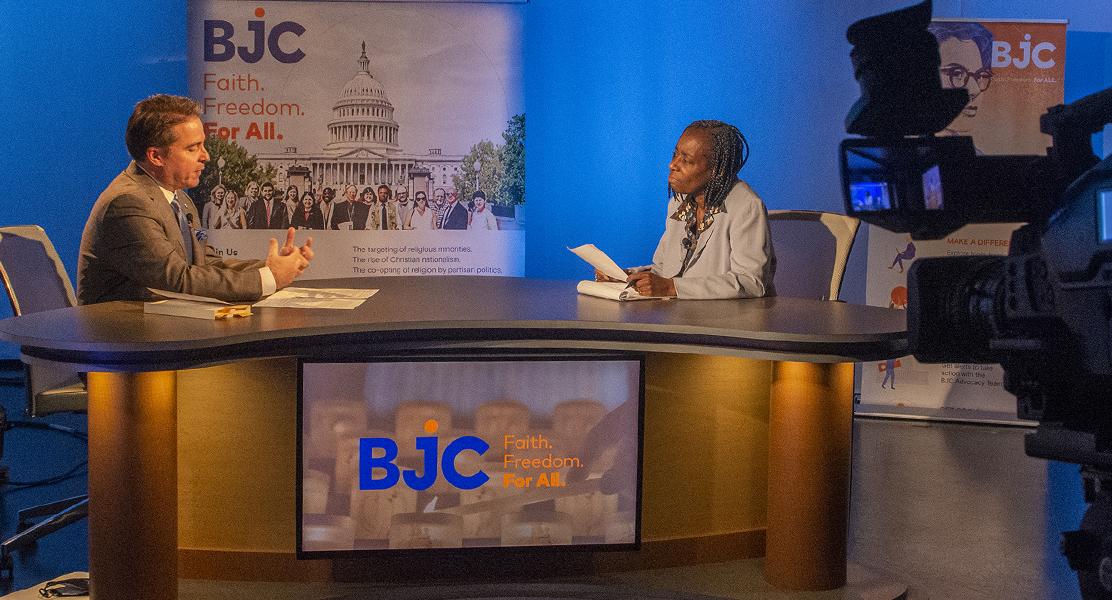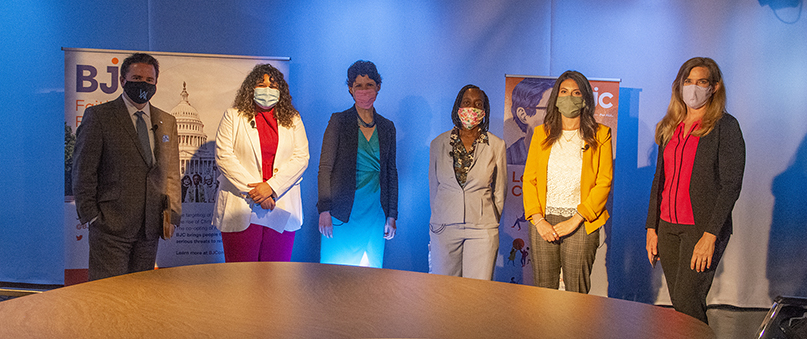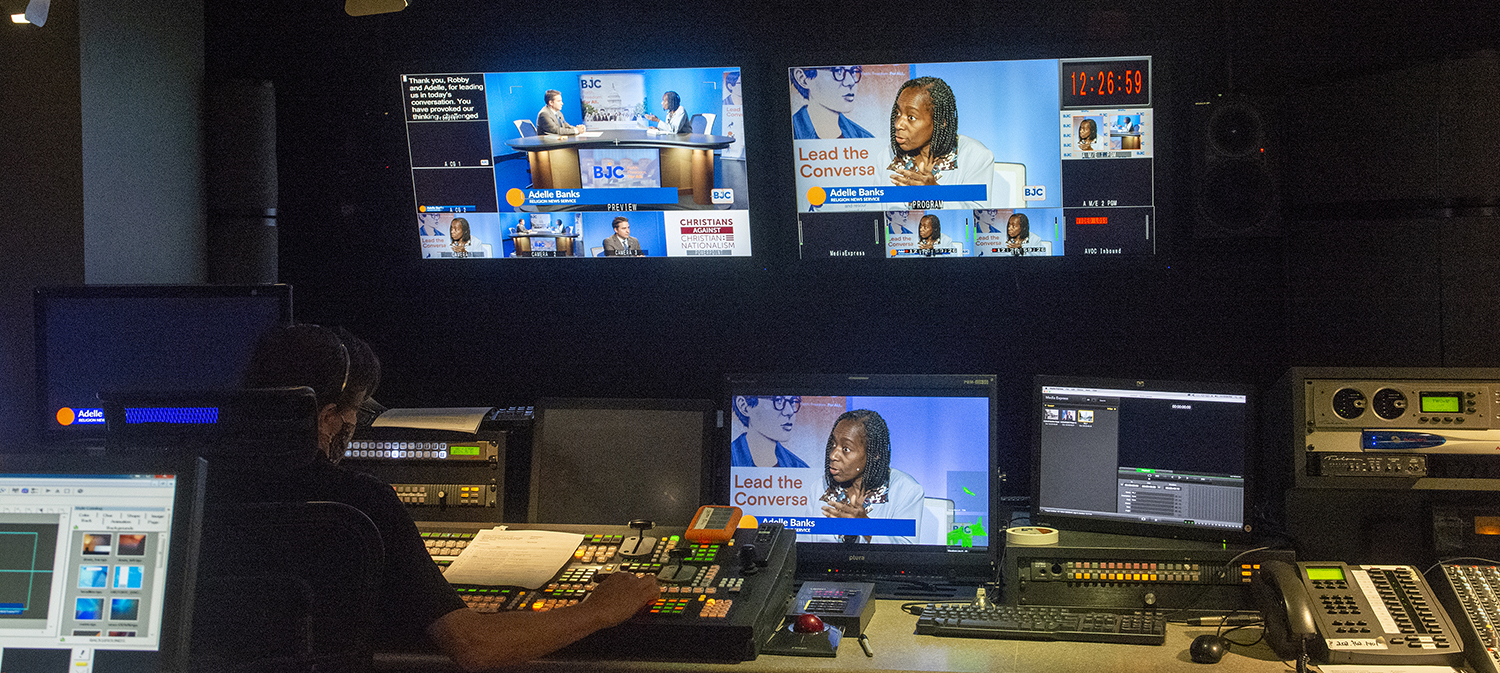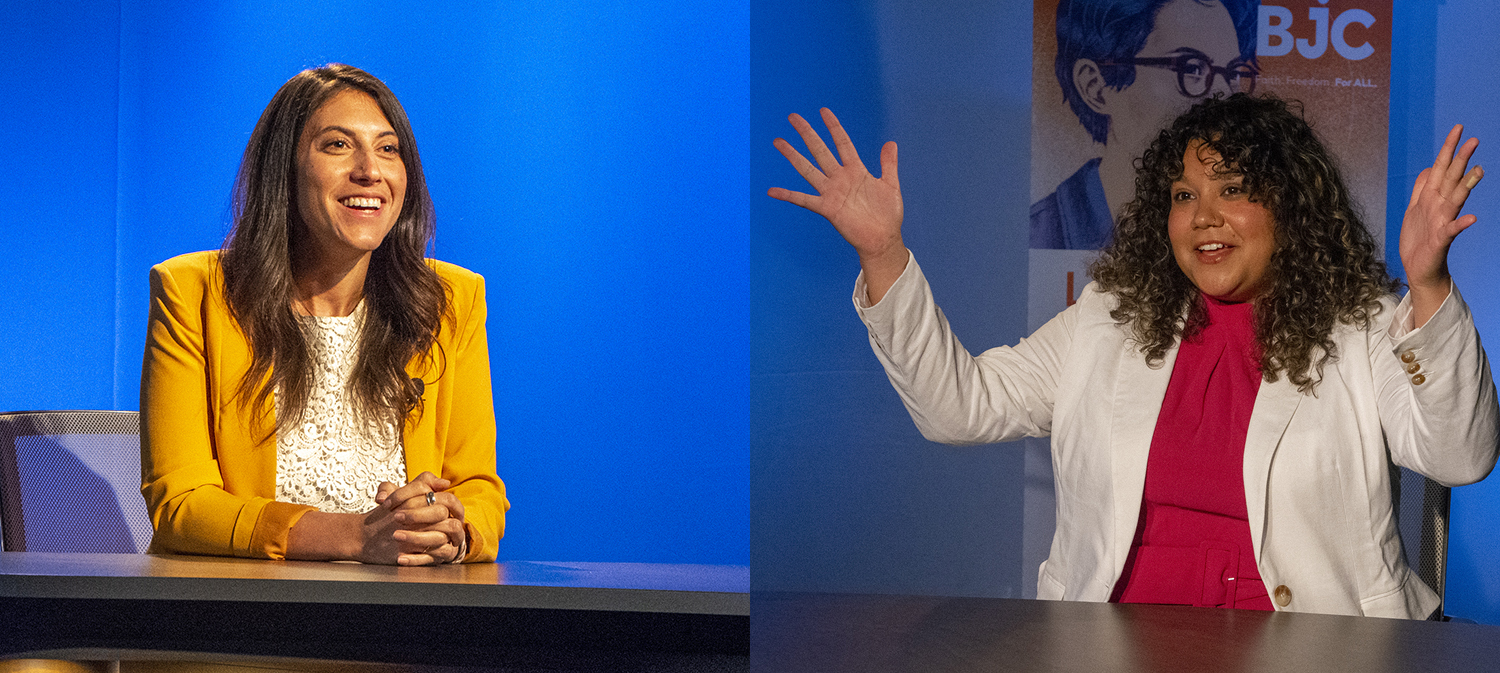Reckoning with white supremacy in American Christianity
BJC Luncheon charts a new path forward amid a pandemic and a national conversation on racism

How do you reconcile a faith that was designed to be compatible with white supremacy?
At this year’s BJC Luncheon, Robert P. Jones presented powerful research and personal testimony on the racial subjugation often intertwined in white American Christianity, calling on Christians to dismantle the white supremacy that has become integrated with their faith. The program also included members of the BJC community and staff sharing stories and charting a path forward.

For the first time in the 30-year history of the BJC Luncheon, it was a virtual event, forgoing an in-person gathering due to the COVID-19 pandemic. Broadcast live from the National Press Club studios in Washington, D.C., to more than 1,000 people across the country, the program featured a national conversation on white supremacy and American Christianity with Jones, who is a researcher and the founder of Public Religion Research Institute (PRRI), and journalist Adelle Banks, who serves as production editor and a national reporter for Religion News Service.
In her introduction of Jones and Banks, BJC General Counsel Holly Hollman set the stage for the conversation, reminding viewers that working for a unified future also means taking a hard look at our personal and political pasts.
“It is crucial that we all stop to think about what we learned and didn’t learn, growing up inside and outside of church, and how that continues to shape and affect us all,” she said.
In the conversation, Jones discussed how he became aware of the realities of racism in his Baptist tradition, sounding the alarm on how racism still plagues white Christianity in the United States. He shared research and his personal stories that led him to write his latest book, White Too Long: The Legacy of White Supremacy in American Christianity.
Growing up Baptist in Mississippi in the 1970s, Jones said he went to church five times a week and lived in a community where, for example, he passed by a Ku Klux Klan demonstration on the way to a soccer field. But, moments like that weren’t talked about in church.
“I heard virtually nothing about racial justice, about what we might owe African Americans, about the role that white Christians had played in slavery, segregation, tearing down Reconstruction right after the Civil War – none of that – there was just a deafening silence,” he said.
“This was a silence that Martin Luther King Jr. criticized southern churches for having,” said Banks, “and it seems like you’re saying that silence is still with us.”
Jones agreed, noting that the picture King paints in his famous Letter from a Birmingham Jail of people remaining silent and anesthetized behind stained glass windows reflects his experience.
Jones pointed out that when the phrase “white supremacy” is used, many people just associate that with extreme examples. But, he challenged viewers to flip the phrase around and think of it as the “supremacy of whites” instead. Doing so, it’s not hard to see how society has been set up that way – from neighborhood real estate requirements to mass incarceration or how COVID-19 is disproportionally affecting the African American community.
“Now those aren’t accidents. Those are the results of really centuries of structural injustice built into our institutions and our psyches,” he said.
In his research, Jones found a shockingly high relationship between white Christian identity and racist attitudes, including an inability to see structural racism. He noted that white Christians were essentially twice as likely as religiously unaffiliated Americans to say the killings of African American men are isolated incidents instead of a broader pattern, and there is a similar disparity in attitudes about displays of the Confederate flag.
His research shows that, overall, white Christians are consistently further away from African American attitudes on all kinds of racial justice issues as compared to whites who are religiously unaffiliated.
“This is not just a white evangelical problem,” he noted. “It’s a white Catholic problem and a white mainline Protestant problem, even when you control for other factors like politics and geography.”
Jones said right now, there’s a question that white Christians need to sit with and ponder.
“What does it say about a faith that was founded, by design, to be compatible with slavery and white supremacy? What does that mean for us today?” he asked. “And I think we’re at a moment of reckoning in the country today where that question is getting called.”

Jones said it can take some time, but it’s important for white Christians to really sit with their own memories and reflect on their experiences, taking the first steps toward telling the truth about where we are. He echoed James Baldwin, noting that you can only change things that you can see and talk about.
Because of the prevalence of white supremacy in U.S. Christianity, every white Christian in the United States has work to do in dismantling white supremacist structures of power, domination and violence.
Following the conversation, BJC Executive Director Amanda Tyler issued a powerful call for all Christians to do the work and take a stand.
“We won’t have faith freedom for all without racial justice,” Tyler said. “Just as American Christianity has been white too long, so has our American concept of religious freedom. Adding more diverse voices to our study of and advocacy for religious freedom will only strengthen our support for it.”
Tyler noted that the impact of white supremacy on religion and other aspects of our society persists in some ways that are rarely noticed or understood, and the work to unravel that racism will take many years. The BJC Board of Directors named a Special Committee on Race and Religious Liberty in 2019 to examine BJC’s own history and report this year with recommendations on action.
Tyler also said we must guard against efforts to co-opt American Christianity for political uses and new efforts that distort religious freedom. “In other words, we must firmly reject Christian nationalism.”
A political ideology and cultural framework that seeks to merge American and Christian identities, Christian nationalism suggests that “true” Christians are Americans and that “real” Americans are Christian. It demands a privileged place for Christianity in our laws and government, ignoring foundational principles that protect faith freedom for all.
“Christian nationalism acts a lot like racism – it’s pervasive, insidious and infects all aspects of American life,” Tyler said. “Just like racism, we are all impacted by Christian nationalism, no matter our race, ethnicity, gender or religion. The way it shows up for us, though, varies by our perspective, experience and identity. And Christian nationalism, in the hands of white Christians, particularly those who feel threatened by changing culture and a perceived loss of power, can be particularly dangerous to those who are out of power, to the disenfranchised and vulnerable.”
Tyler said extreme examples of Christian nationalism – such as deadly attacks on houses of worship – often distract us from the more mundane, everyday examples that are just as dangerous because they are so embedded in our society.
Tyler called on all Christians to sign the statement standing against Christian nationalism, at ChristiansAgainstChristianNationalism.org.
The luncheon program, generously underwritten by Patsy Ayres and dozens of virtual table sponsors and individual donors from across the nation, also included members of the BJC community discussing the importance of continuing to protect faith freedom for all at this crucial moment in our nation’s history.

BJC Board member Sofi Hersher discussed her experiences as a young Jewish woman in the United States. When her Sacramento synagogue was firebombed by white supremacist Christian nationalists in 1999, Hersher found hope in interfaith alliances that spoke up against violence after the attack.
“It was a very, very difficult summer, but it was our Christian, Muslim, Buddhist and Sikh neighbors who sustained us,” Hersher said.
Barry Black, the chaplain of the U.S. Senate, gave the opening invocation for the luncheon, and the Rev. Alyssa Aldape, a member of the BJC Board of Directors, provided the closing benediction.
The conversation continued after the event, as BJC Director of Education Charles Watson Jr. led a live discussion on Facebook with Dr. Alphonso F. Saville IV, a scholar who serves at Georgetown University as the Andrew W. Mellon postdoctoral fellow for American Religion and Slavery in the Department of Theology.
Their conversation focused on the multiple narratives of our country’s history and the story of the Gospel.
“The ways in which Christianity has remained colonized by white supremacy has really enabled it to become a shallow tradition, the kind of tradition that does not engage and reflect deeply,” Saville said.

Watson pointed out that if Christians are going to talk about Christianity, then that means going to Jesus for truth and telling the truth about Jesus, including the pictures and symbols used.
“If you have pictures of God and Jesus that are white, then we are talking about not being truthful from the beginning,” he said. “If you really want to have truth or have truth serum in your conversation … you have to think about how white supremacy or whiteness has been put into every aspect of our American life and every aspect of our Christian life here in America.”
Saville and Watson discussed how crucial it is in our current moment to tell all of our stories, including the difficult ones.
“The legacy of slavery continues to privilege certain segments of the population, and to curse that legacy or to call into question the goodness or the legitimacy of America’s religious history is to call into question one’s own legitimacy as one who has been privileged throughout the history,” Saville said.
Noting that Robert P. Jones mentioned being active in Christian communities but not having to encounter different perspectives until later, Watson and Saville shared his warning of the dangers in that theological upbringing.
“The personalized Jesus is the dominant view of Christianity because it makes it very easy to hide, to be silent in these moments when society looks to the church for moral, ethical, spiritual leadership,” Saville said.
Click here to watch the entire BJC Luncheon, and click here to watch the Facebook discussion between Charles Watson Jr. and Dr. Alphonso Saville IV.
This column appeared in the summer 2020 edition of Report from the Capital. You can read the entire magazine as a PDF or a digital flip-through edition.




